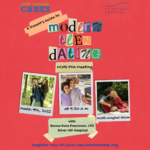PUBERTY, SEX ED, & TEEN RELATIONSHIPS
CARES Programs & Resources

NCHS - PFA General Meeting
This program was an open and honest conversation about modern teen dating. Emma Kate Freatman taught parents what teens wished their parents knew, what misconceptions teens think their parents have, and what questions teens wanted their parents to ask them about their dating lives. Parents left this PFA presentation with tips on how to start the conversation about dating with their teens, and how to keep the conversation going.
The slide deck Emma Kate Freatman used as a visual aid can be downloaded here.

CARES Program, Ann Rodwell-Lawton, MSW from DVCCCT
This program will give you tools to help your child understand: what a healthy relationship looks and feels like, relationship skills including setting boundaries, the importance of healthy communication, and how to identify unhealthy relationships dynamics rooted in power and control.

New Canaan CARES
Do NOT expect your middle schooler to ask you questions about puberty or sexuality, it may NEVER happen! You must open, and continue the series of many conversations. There is no such thing as starting the conversation too early.
There is age-appropriate information to share with your child – and remember that each child will be ready at a different age to receive it – and often in a different way.

New Canaan CARES
A chart to help you as a parent understand the pubescent development of your child. Every child develops differently – with some genetic consistencies.

New Canaan CARES
Teens are doing their job as we as parents do ours – their brain is ill-equipped to do the planning without support from an adult – but is perfectly suited for innovating, social cuing, and learning.
Additional Resources


Child Mind Institute
It’s important for parents to tell kids it’s not okay to pressure someone into going farther than they are ready for. And no one should feel they need to give in to pressure, either from a partner or from friends, to have sex if they’re not ready.

The Washington Post
Kids have five core needs when it comes to sexuality, Roffman explains. They need affirmation and unconditional love; information about healthy and unhealthy behaviors; clarity about values such as respect and integrity; appropriate boundaries and limits; and guidance about making responsible, safe choices.

KidsHealth.org
Going through puberty early also can be hard for kids emotionally and socially. Girls with precocious puberty, for example, may be confused or embarrassed about getting their periods or having enlarged breasts well before any of their peers. They may be treated differently because they look older. Boys can become more aggressive and also develop a sex drive inappropriate for their age.

HealthyChildren.org
There are many opportunities during this time of life for you to talk to your child about what she’s experiencing. Your child needs to understand the physical changes that will occur in her body during puberty.

KidsHealth.org
Kids see and hear a lot about sex and relationships on TV and online. By the time they near puberty, they may be familiar with some advanced ideas. But talking about puberty is still an important job for parents because not all this other information is reliable.

KidsHealth.org
Kids see and hear a lot about sex and relationships on TV and online. By the time they near puberty, they may be familiar with some advanced ideas. But talking about puberty is still an important job for parents because not all this other information is reliable.

Psychology Today
Too many parents wait for the “right” time to come along for the talk, only to find that it never does—and then they don’t have the talk at all, or it only happens after their kid has already become sexually active, which is obviously too late. By starting when they’re young, you have a chance to ease into things and make sure your child has the information they need when they need it.

U.S. News - Health
We know that girls who go through puberty early are more likely to experience various medical and psychological problems, such as depression, obesity, eating disorders and even cancer when they’re older.

Child Mind Institute
Teenagers can be prickly about their privacy, especially when it comes to something as intimate as romance. The potential for embarrassment all around can prevent us from giving them any advice for having healthy and happy relationships. Teenagers do look to us for guidance, though—even when they’d rather die than acknowledge that they are—and we can often have more influence than we realize.

